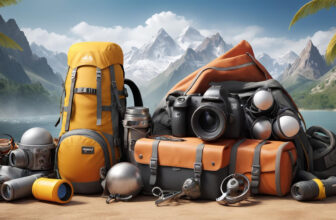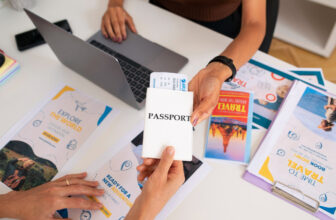
Traveling is an exciting experience, but it also comes with its share of risks, from flight cancellations to medical emergencies. Having a travel insurance policy is crucial, but it’s just as important to ensure that your plan covers everything you might need before you board that plane. To help you prepare, here’s the ultimate checklist of key items to review in your travel insurance plan before your next trip.
1. Understand Your Coverage Details
Before you leave, thoroughly review your insurance policy to ensure you understand what’s covered and what isn’t. The last thing you want is to assume you’re covered for something only to find out later that it’s excluded.
- Trip Cancellation and Interruption: Does your policy cover cancellations due to unforeseen events such as illness, a family emergency, or extreme weather?
- Medical Emergencies: Verify that the plan covers emergency medical expenses abroad. Check if it includes hospitalization, doctor visits, and any emergency treatments.
- Evacuation Coverage: Ensure your plan covers medical evacuations in case you need to be transported to a hospital, especially from remote locations or if the local medical facilities aren’t adequate.
2. Check Coverage for Pre-Existing Medical Conditions
If you have any pre-existing health conditions, it’s critical to understand how your travel insurance handles them. Some policies may cover them if disclosed in advance, while others exclude pre-existing conditions entirely. Ensure that:
- Your condition is either covered or excluded under a specific waiver.
- You’ve filled out any required medical forms to declare pre-existing conditions.
- You’ve met any “look-back” periods required for coverage, where your condition must be stable for a certain time before the trip.
3. Review Policy Exclusions
Every travel insurance policy comes with exclusions, which are situations or events not covered under the plan. Common exclusions include:
- Adventure Sports: Many policies exclude high-risk activities like skiing, scuba diving, or rock climbing. If you plan on participating in any extreme sports, confirm whether your policy includes coverage, or consider purchasing additional coverage.
- Pandemic and Epidemic Exclusions: In light of recent global events, check whether your policy covers cancellations or medical issues related to pandemics or epidemics like COVID-19.
- Acts of Terrorism and Natural Disasters: These are often excluded or require specific coverage. Check if your policy includes these events if you’re traveling to high-risk areas.
4. Verify Destination-Specific Coverage
Certain regions may require specialized coverage, particularly if you’re traveling to areas with unique risks or expensive healthcare systems. Check:
- Country Restrictions: Some insurance companies may limit or exclude coverage for certain countries due to political instability, natural disaster risks, or health concerns.
- Healthcare Costs Abroad: Verify whether your plan covers the actual costs of healthcare in your destination. Countries like the U.S. or Switzerland have very high medical costs, so you may need higher coverage limits.
5. Check the Coverage Limits
Review the maximum coverage limits for various types of claims. Different policies offer varying levels of coverage for trip cancellations, medical expenses, and personal belongings. Ensure that the coverage limits meet your needs:
- Medical Coverage: Ensure the amount is sufficient to cover any potential medical emergencies abroad, including hospitalization and surgeries.
- Baggage and Personal Items: Review the maximum payout for lost, stolen, or damaged items. If you’re traveling with expensive electronics or gear, check if you need extra coverage.
- Trip Cancellation/Interruption: Compare the coverage amount to your trip costs, including non-refundable airfare, accommodations, and pre-booked tours.
6. Confirm Travel Delay and Missed Connection Coverage
Delays and missed connections can happen due to weather or airline issues. Make sure your policy includes:
- Travel Delay: Check how much the policy covers for costs related to delays, such as meals, hotel stays, and transportation.
- Missed Connections: Verify that your policy provides compensation if you miss a connecting flight or transport due to circumstances outside your control.
7. Review Policy Duration and Validity
Ensure your travel insurance policy is valid for the entire duration of your trip. If you’re taking an extended vacation, make sure your coverage lasts long enough:
- Check Start and End Dates: Verify that your policy covers from the moment you leave home until you return.
- Extendable Policies: If you’re unsure about your return date, confirm whether your policy can be extended while you’re abroad.
8. Know the Claims Process
Before you depart, familiarize yourself with the claims process. This will save you stress if you need to make a claim while traveling:
- Documents Required: Make sure you know what documentation you’ll need to submit in the event of a claim (e.g., receipts for expenses, medical reports, police reports for theft).
- Claim Timeframe: Understand the window of time you have to file a claim. Some insurers require that claims be filed within a certain period after an event occurs.
- How to File a Claim: Know whether you can file claims online, by phone, or by mail, and ensure you have the necessary contact details saved.
9. Emergency Contact Information
Save your travel insurance company’s emergency contact details. Many providers offer 24/7 helplines for medical emergencies, travel disruptions, or lost baggage. Make sure you have:
- Emergency Hotline Number: Keep the phone number handy for quick access.
- Local Representatives: Some insurers have local partners or representatives who can assist you in case of an emergency abroad.
- Claim Support Contacts: Make sure you know how to contact your insurer for non-emergency claim support as well.
10. Check for Coverage of Personal Belongings
If you’re traveling with valuable items like laptops, cameras, or jewelry, confirm that your travel insurance policy offers enough coverage for these items.
- Max Value Per Item: Some policies cap the amount they’ll reimburse for each item. Make sure this limit is adequate for your belongings.
- Theft and Damage: Confirm whether your policy covers loss due to theft, accidental damage, or misplacement of personal belongings.
- Check Exclusions: Look for any exclusions, like coverage for electronic devices left unattended in public places.
11. Verify Cancel for Any Reason (CFAR) Coverage
Cancel for Any Reason (CFAR) coverage allows you to cancel your trip for non-traditional reasons and still recover some of your costs. It’s not included in standard travel insurance and is typically available as an add-on.
- Check the Window for Purchasing: CFAR often has a time-sensitive purchase window, typically within 14-21 days of your initial trip deposit.
- Understand Reimbursement Rates: CFAR usually refunds up to 75% of non-refundable trip costs, not 100%.
12. Assess Whether You Need Additional Coverage
Depending on your travel plans, you may need extra coverage for specific situations. Consider adding these options if they apply to you:
- Rental Car Insurance: If you’re renting a car abroad, check whether your travel insurance policy offers coverage for accidents, theft, or damage.
- Adventure Sports Coverage: If you plan on participating in extreme sports, such as skiing, scuba diving, or zip-lining, you may need additional coverage for high-risk activities.
- Business Trip Insurance: If your trip involves work, consider policies that cover work-related risks such as lost laptops, client meetings, or company property.
13. Review Policy for Family or Group Coverage
If you’re traveling with family or friends, make sure your policy covers everyone in your group. Some policies offer group coverage, while others require individual policies for each traveler.
- Dependent Children: Confirm whether your policy covers dependent children under a certain age traveling with you.
- Spouse or Partner: Ensure that your spouse or travel partner is included in the coverage if you’re purchasing family travel insurance.
Conclusion: Be Fully Prepared Before Your Trip
Having travel insurance is essential, but equally important is making sure it’s the right plan for your trip. By carefully reviewing your travel insurance coverage before your next journey, you can avoid unwanted surprises and ensure you’re fully protected against potential mishaps. Use this checklist to confirm that your plan meets your needs, and travel with peace of mind, knowing you’re well-prepared for any unexpected situations that may arise.



